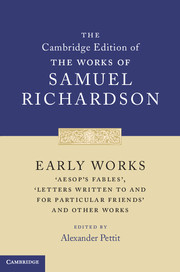Book contents
- Frontmatter
- Dedication
- Contents
- General Editors’ Preface
- Acknowledgements
- Chronology
- List of Abbreviations
- General Introduction
- Textual Introduction
- The Apprentice’s Vade Mecum (1733)
- A Seasonable Examination of the Pleas and Pretensions (1735)
- Preface to Aubin, A Collection of Entertaining Histories and Novels (1739)
- Aesop’s Fables (1739)
- Letters Written to and for Particular Friends (1741)
- Six Original Letters Upon Duelling (1765)
- Appendix: The Infidel Convicted (1731)
- Postscript
- Emendations
- Word-division
- Bibliographical Descriptions of Early Editions
- Explanatory Notes
- Index
The Fables of Æsop, &C
Published online by Cambridge University Press: 30 June 2022
- Frontmatter
- Dedication
- Contents
- General Editors’ Preface
- Acknowledgements
- Chronology
- List of Abbreviations
- General Introduction
- Textual Introduction
- The Apprentice’s Vade Mecum (1733)
- A Seasonable Examination of the Pleas and Pretensions (1735)
- Preface to Aubin, A Collection of Entertaining Histories and Novels (1739)
- Aesop’s Fables (1739)
- Letters Written to and for Particular Friends (1741)
- Six Original Letters Upon Duelling (1765)
- Appendix: The Infidel Convicted (1731)
- Postscript
- Emendations
- Word-division
- Bibliographical Descriptions of Early Editions
- Explanatory Notes
- Index
Summary
FABLE 1. A COCK and a PRECIOUS STONE.
As a Cock was scratching upon a Dunghill, he turn’d up a precious Stone. Well, says he, this sparkling Foolery to a Jeweller, would have been something; but to me, a Barley-Corn is worth an hundred Diamonds.
MORAL.
A wise Man will always prefer Things necessary before Matters of Curiosity, Ornament, or Pleasure.
REFLECTION.
The Moralists, as Sir Roger L’Estrange observes, will have Wisdom and Virtue to be meant by the Diamond; the World, and the Pleasures of it, by the Dunghill; and by the Cock, a voluptuous Man, who abandons himself to his Lusts, without any regard, either to the Study, the Practice, or the Excellency of better things.
But, adds he, with the Favour of the Ancients, this Fable seems rather to hold forth an Emblem of Industry and Moderation. The Cock lives by his honest Labour: His scraping upon the Dunghill is but working in his Calling: The precious Stone is only a gaudy Temptation thrown in his way, to divert him from his Business and his Duty: He would have been glad, he says, of a Barley-Corn instead of it, and so casts it aside as a thing not worth heeding. This is passing of a true Estimate upon the Matter, in preferring that which Providence has pronounced to be the Staff of Life, before a glittering Gew-gaw, that has no other Value than what Vanity, Pride and Luxury have set upon it. The Price of the Market to a Jeweller in his Trade, is one thing; but the intrinsick Worth of a thing to a Man of Sense and Judgment, is another. Nay, that very Lapidary himself, as the same Author observes, with a coming Stomach, and in the Cock's Place, would have made the Cock's Choice. The Doctrine, in short, is, That we are to prefer things necessary before things superfluous; the Comforts and the Blessings of Providence before the dazling and splendid Curiosities of Mode and Imagination: And finally, that we are not to govern our Lives by Fancy, but by Reason.
- Type
- Chapter
- Information
- Early Works'Aesop's Fables', 'Letters Written to and for Particular Friends' and Other Works, pp. 132 - 320Publisher: Cambridge University PressPrint publication year: 2011

